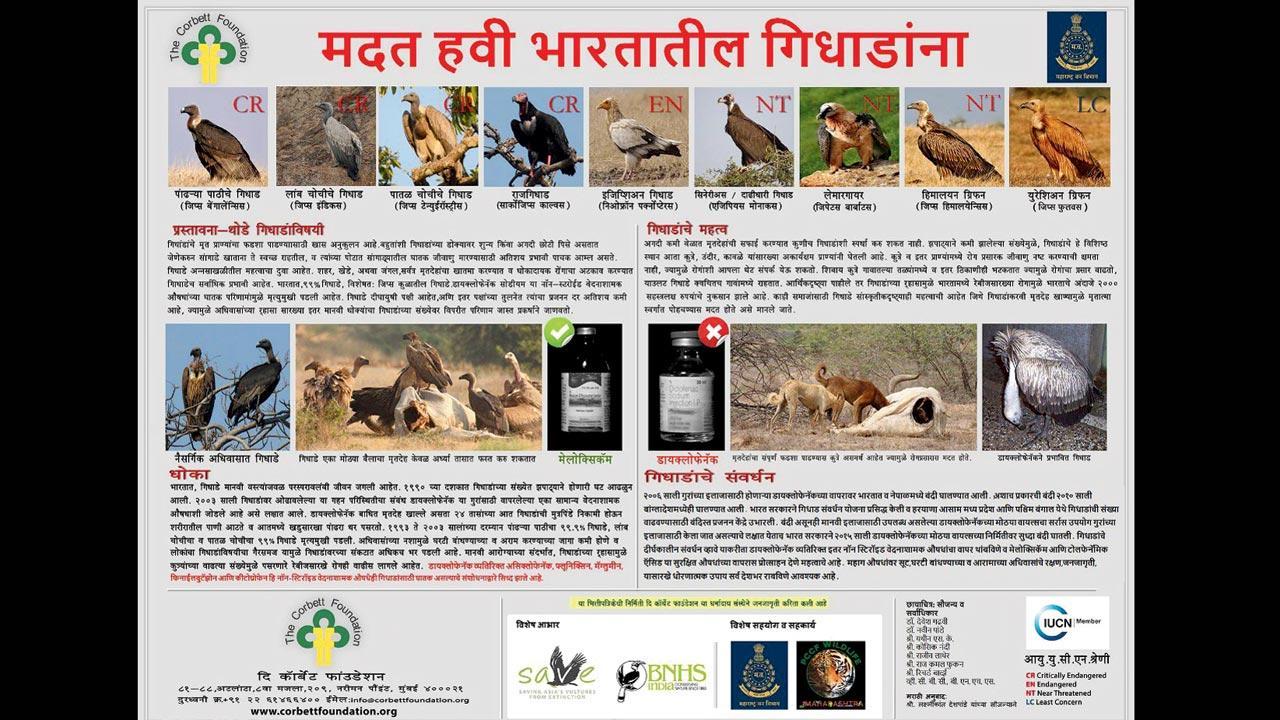State forest department and Corbett Foundation to take conservation measures to remote villages; seek to highlight the many threats to the bird

The poster that seeks to raise awareness about vulture conservation
The Maharashtra forest department and The Corbett Foundation have joined forces to raise awareness about the conservation of vultures in the state and help in the recovery of the scavenging birds, which are vital in maintaining the health of the ecosystem.
ADVERTISEMENT
The government wants people in remote villages to understand the importance of vultures, and posters in local languages have been prepared to this end.
The posters will be circulated across the state by the forest department, animal husbandry department, NGOs, local communities and nature lovers.
An informative poster in Marathi has been developed in consultation with the Bombay Natural History Society (BNHS) and SAVE (Saving Asia’s Vultures from Extinction).
The poster highlights the problems faced by the vultures in India—one of the main threats being the toxicity of veterinary-use non-steroidal anti-inflammatory drugs (NSAID), such as diclofenac.
It was in the 1990s that the studies done by the BNHS highlighted the drastic decline of vulture populations across India due to diclofenac toxicity. Based on this research, veterinary use of the drug was banned in India in 2006.
Also read: Mumbai: Two endangered Indian Vultures spotted in TWS
The harmful drugs
Despite this ban, human-use diclofenac was being used in veterinary treatments. To prevent this, in 2015, the government of India banned the production of multidose vials of diclofenac in human medicine. However, recent scientific findings also suggest that veterinary use of aceclofenac, flunixin, carprofen, meglumine, phenylbutazone and ketoprofen are also harmful to vultures.
Kedar Gore, director of The Corbett Foundation, said, “Unless the veterinary use of all these NSAIDs are severely restricted and safe alternative drugs, like meloxicam and tolfenamic acid are promoted, the sword of extinction will loom over these majestic and ecologically important birds.”
Gore’s organisation, a SAVE associate and a member of the International Union for Conservation of Nature, has been involved in vulture conservation, research, awareness and advocacy for over a decade.
Need to do more
The forest department has also partnered with Ela Foundation and Sahyadri Nisarg Mitra to promote vulture conservation in the state. Sunil Limaye, PCCF (Wildlife) and chief wildlife warden, Maharashtra, said, “For the past several years, many in-situ conservation programmes like protecting habitats, promoting vulture restaurants and satellite tagging of the birds are being undertaken by the forest department. But these efforts need to be supported by ex-situ conservation measures like establishing a conservation breeding centre for vultures in the state, which is also a part of the Action Plan for Vulture Conservation in India, 2020-2025 released by the ministry of environment, forest and climate change.”
He added that the Konkan, western Maharashtra and the Vidarbha regions still have the requisite habitats needed to act as long-term breeding areas for the white-rumped, Indian and Egyptian vultures, which are native to the state.
 Subscribe today by clicking the link and stay updated with the latest news!" Click here!
Subscribe today by clicking the link and stay updated with the latest news!" Click here!







